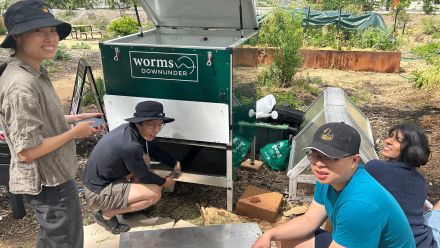Supporting Indigenous cultures and histories: the role of philanthropy
For most of my PhD candidacy, I was a single mum working full-time, and the Award made a tremendous difference at the critical stage just before completion
The National Centre for Indigenous Studies (NCIS) works to ensure that Indigenous knowledge, perspectives and experiences are respected, valued, accessed and incorporated into all learning environments at ANU and beyond. Attracting and supporting Indigenous undergraduate and postgraduate students, coupled with increased Indigenous academic and professional staff at all levels is a significant focus for ANU.
Philanthropy is an important means by which the NCIS can evolve its vision beyond the strictures of government and traditional research funding. Professor Mick Dodson AM, Director of NCIS, says:
"We have been very lucky that some donors have seen fit to make a contribution to our centre. These are not overly large donations, but they are having an immense impact on our work. In particular, philanthropic support has allowed individual higher degree research scholars to undertake and complete their PhD research."
In 2016, Magali McDuffie was awarded the Watervale Graduate Award. This competitive annual award provides $10,000 for an MPhil or PhD scholar at NCIS. In her PhD, Magali uses filmed interviews and narratives to look at how three Nyikina sisters have responded and adapted to different waves of government policies, spanning 80 years and three generations. Magali says:
"Being the recipient of the Watervale Award was not only a huge honour, but it also enabled me to concentrate on the final stretch of my PhD without feeling pressured financially."
"For most of my PhD candidacy, I was a single mum working full-time, and the Award made a tremendous difference at the critical stage just before completion."
Another important vehicle for philanthropy at the NCIS is the NCIS Research Fund which supports researchers and projects that deepen Australia's understanding of Indigenous cultures and histories.
The fund was originally set up as a result of PhD scholar Corrine Walsh's anthropological work on ear disease, one of the most significant health issues facing Indigenous people. Without philanthropic funding, Corinne would have struggled to secure a field site within her first year.
She remarks: "The donation will also continue to assist with the nuts and bolts of PhD life. It will enable me to live in the field for an extended period and conduct future travel - which is essential to my research."
Professor Dodson believes that the benefits of philanthropy continue to flourish with time. He says:
"We have also recently garnered some support for seeding innovative research ideas. While the support helps individual researchers, this has an exponential impact on the broader research issues we are tackling and, as the research blossoms, the support given now will continue to multiply into the future."

